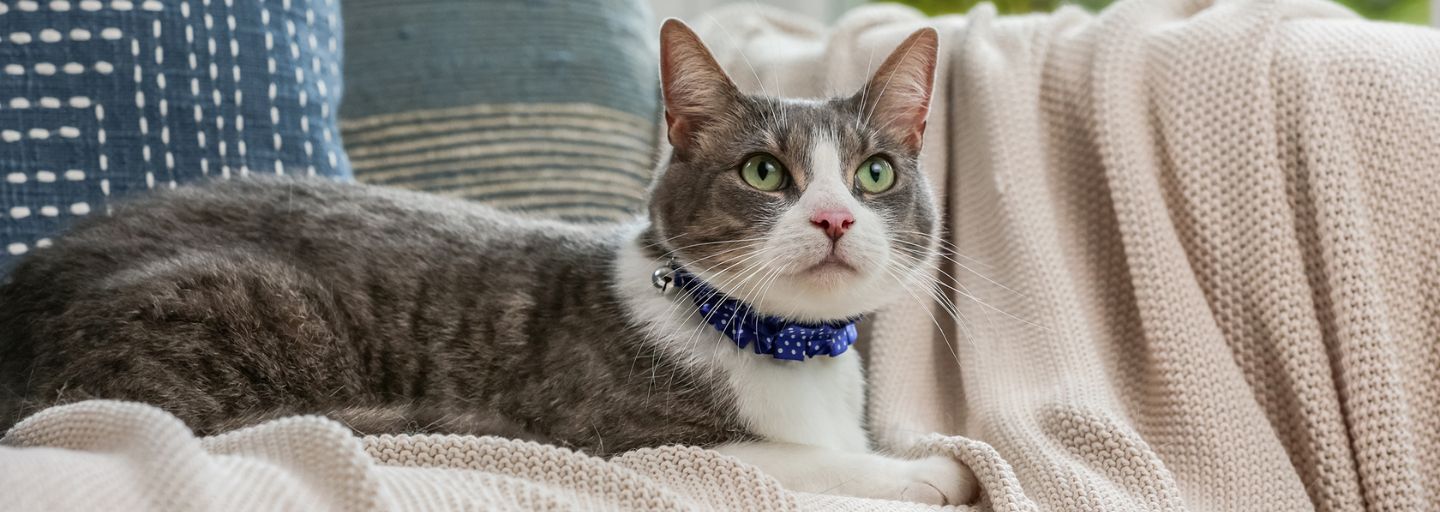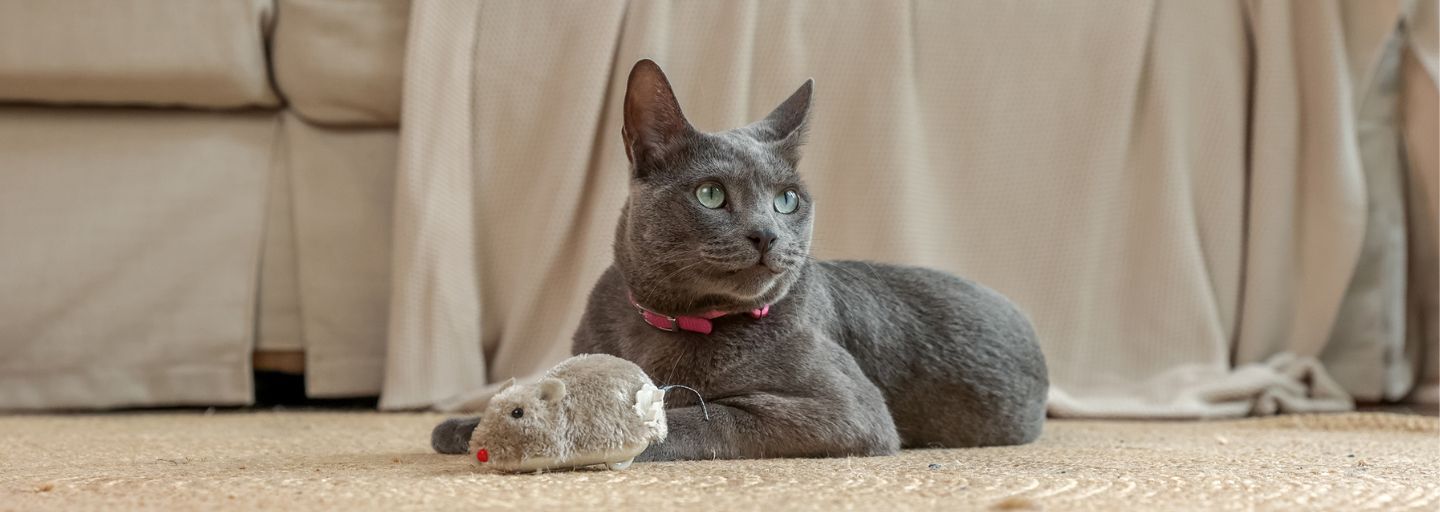One of the most common health concerns for household pets is intestinal worms in cats and dogs. These internal parasites usually live in your cat’s digestive system and can be detrimental to your cat’s health. If your cat or kitten has worms, it is important to seek the appropriate treatment.
Symptoms of worms in cats
The most noticeable symptom of intestinal worms, such as tapeworms, in cats, is visible white segments which appear in your cat’s stool, around their rear, or in their bedding. These segments resemble grains of rice but are actually broken pieces of your cat’s intestinal worms.
Other symptoms of worms in cats may include:
- Weight loss and a bloated stomach
- A change in coat condition, with coarser or duller fur
- A change in bowel habits, particularly the onset of diarrhea
- Visible white worms in your cat’s stool, around their anus, or in their bedding
- Lethargy and a lack of energy or interest that is out of the ordinary
If you suspect an infestation in your pet, consult a veterinarian and consider effective worm treatment for cats. You can also deworm your kitten from two weeks of age.
When to treat your cat
Kittens are commonly born with worms or become infected early in life, especially with roundworms, which can be transmitted through their mother’s milk. Kittens should be wormed at two, four, six, eight, and twelve weeks of age. After this, they can be treated with an all-wormer for cats every three months.
Pregnant and nursing cats should also be treated with worm medication during mating and before giving birth to a litter, as they can pass on intestinal worms to their kittens.
If your cat has a heavy worm infestation, you may need to repeat your cat wormer ten days after the initial dose is administered.
How to treat your cat
The most common worms contracted by cats in Australia are tapeworms, roundworms, and hookworms. These parasites are often treated with a specially formulated all-wormer for cats with effective active ingredients that kill and control the worms.
Most cats will develop a worm infestation at some point in their lives. However, you can prevent worms in your cat by administering worm medication on a regular three-month schedule. It is important to maintain this routine, as re-infection or infection from other cats can be a common problem.
When selecting an all-wormer for cats, there are many different options to choose from, including tablets, spot-ons, and pastes. Palatable all-worm tablets are usually small in size and coated in tasty flavors to make them easier for your cat to consume. However, cat worming pastes can also be an easy and effective option for cats that have difficulty with tablets. If you’re not sure which option to pick or how to treat your cat, ask your vet.
When administering tapeworm treatment for cats, it’s also important to consider flea control. Cats often contract tapeworms by swallowing fleas, and a cat with fleas can easily be reinfected. Consider pairing your cat worming tablets with an effective flea prevention treatment.
Here are some helpful tips to prevent reinfection of worms in your cat:
- Clean up your cat’s stool promptly, at least daily
- Keep your cat’s living environment clean
- Avoid contact between your cat and other unknown cats and their stool
- Administer cat wormer on a regular schedule
- Visit the vet if worms persist
Common Worms and Parasites
Tapeworms are a common problem for adult cats. Cats can acquire tapeworms by eating a rodent or ingesting a flea that is carrying an immature tapeworm, so flea control is important. Small, white worm segments around your cat’s anus or in their litter pan indicate that tapeworms are present.
Roundworms can be passed on from a mother cat to kittens through her milk. Take a stool sample to the veterinarian when your cat is scheduled for her regular shots to ensure roundworms are not present. These intestinal parasites may cause weight loss, weakness, diarrhea, or mucus in the stool.
Hookworms may be passed on before birth or when nursing. If possible, keep your adult cat treated at mating and during nursing, and because hookworms can be transmitted through contact with infected feces, keep them away from other cats’ waste. Hookworms cause anemia, diarrhea, weight loss, vomiting, or black, tarry stools.
Ringworm is caused by a fungus that lives on the skin and is very contagious - it can even be transmitted to humans. Ringworm appears as oval bare patches on the skin of your cat. To minimize the risk, avoid unnecessary contact with other cats. If you suspect your cat has ringworm, take them to the veterinarian, as ringworm can only be detected under an ultraviolet light - once detected, your veterinarian will be able to administer the correct treatment.
Heartworm is not as common in cats as it is in dogs, as the immune system of a cat is able to eliminate most infections more easily than a dog. Not all infections are eliminated after the mosquito carrying the immature heartworm bites your cat, and these immature stages can develop to become large worms in the heart and vessels of the lungs. Signs of heartworm in cats vary from case to case, but most cases include sudden death. Ask your veterinarian about the likelihood of heartworm disease in your area.
Other parasites that display similar symptoms as worms are:
Coccidium is an organism that can live in your cat’s intestines and is sometimes ingested through raw or undercooked meat, including rodents. Be sure to clean their litter tray daily, as it takes one to two days for feces to become infectious. Symptoms can include diarrhea, vomiting, weight loss, and loss of appetite.
Toxoplasmosis is a multisystemic parasite that can also be dangerous to humans. Symptoms can include non-specific signs, such as fever and loss of appetite, as well as ocular lesions, difficulty in breathing, and diarrhea.
It is important to treat your cat regularly throughout its adult life. If you have any concerns about treating your cat for parasites, contact your vet. Looking for an all-worming product? Try PURINA TOTAL CARE Allwormer tablets for cats and kittens.
You can also find flea tablets for cats, such as PURINA TOTAL CARE Flea Knockdown, which are administered orally. These tablets are fast-acting and eliminate the fleas in your cats within several hours, allowing your pet to be flea-free.
Always follow the manufacturer's instructions when using any anti-flea product and never use a dog product, as these may be toxic to cats.
When using flea tablets and treatments, it’s important to remove fleas from your cat’s environment, as otherwise, they may quickly be reinfected. Flea eggs can survive for long periods in carpets and cracks between the floorboards, so you will need to make sure to treat your house.
Use a household flea spray, recommended by your vet, at least once a year. If you suffer an infestation, use your vacuum cleaner to bring the eggs and immature fleas in your carpets and upholstery to the surface. Kill the fleas with a household spray so they stop hooking onto the carpet, and then re-vacuum. When you’re finished, spray the vacuum cleaner with flea spray and throw away any vacuum bags. If you don't spray the vacuum cleaner, you run the risk of redistributing the same flea eggs back onto the carpet through the exhaust of the vacuum next time you use it.







